A reverse-chronological running list of published and scheduled short fiction, with links as available.
2016
The Garden of Sons and Husbands
“’Ware!” called the girl at the top of the mast in a pure, high voice but she did not ring her bell before stillness fell upon Elkannar’s Laddy. If the child had not been securely tethered she would have fallen to the deck and perished. In the vessel’s engine well the four laboring trotrots froze but their revolving wheels did not, all at once. Three of the oversized rodents were thrown free while the fourth’s left hindpaw lodged between treads, trapping the insensible creature. Its wheel made one final full revolution, then merely rocked for some minutes, slowing, slowing. The boy who watched the trotrots, tended them, fed them, whipped them when necessary, stilled and crumpled as well in the instant of stroking the ear of his favorite beast, penned on her rest cycle. Below the waterline the four great screws that drove Elkannar’s Laddy faltered to a halt as sympathetic impulses from the trotrots’ wheels failed. The ship slowed. Throughout the merchant vessel all the living went to a standstill, from the pesty bugs that made their kingdoms in the trotrots’ fur to the Holiest, archpresbyter of the Unnamed God, who had requisitioned the captain-navigator’s stateroom for the passage.
A tale of the unimaginably distant future after the moon has broken up and magic and gods have returned to Earth. First published online at GigaNotoSaurus, April 2016.

a vivid, complex story with a great atmosphere and stunning action.
2014
Liam and the Coward
Exhilarated, Liam plunged through the outliers of the oncoming nor’easter, dancing with the gusts and surges. Wind and freezing rain had long since stripped off the last tatters of the glamor he’d worn on the streets of Boston that made him look clothed, human, and older than seventeen and a half. The breath of fairyland, its wild fragrance and flavor, still percolated in his lungs, beat in his blood, helping him forget the manufactured stenches of the city, though once again he had not passed through that door. His dad was expecting him.
Fifth in a projected series of seven suburban-fantasy short stories about a fairy raised by humans in contemporary Massachusetts, following “Liam and the Wild Fairy” (Icarus: The Magazine of Gay Speculative Fiction #5, Spring 2010); “Liam and the Ordinary Boy” (Icarus #10, Fall 2011); “Liam and His Dads” (Icarus #12, Spring 2012); and “Liam and the Changelings” (sentenceandparagraph.com, 26 January 2014). First published here at sentenceandparagraph.com, 16 February 2014. Revised version incorporated into the novel That Door Is a Mischief, Lethe Press, September 2014.
Seb and Duncan and the Sirens
Duncan, being Duncan, had already made friends by the time he erupted from his first dip in the Aegean to chivvy Seb into the water. Fifteen, twenty minutes—two chapters of the novel Seb had saved for vacation. “You can read in bed or on the plane home,” Duncan boomed like the hugest pipe of a Baroque organ, thundery, melodious. Looming over Seb, he cast a cold shadow and dripped perilously close to Seb’s Nook. “We’re on a beach, fergodsake. On a Greek island. You’re not allowed to be a bookworm. I’ve got people for you to meet.” Duncan pretended not to possess a brain.
A novelette about, well, what it says on the tin. First published in Glitterwolf Magazine, Issue 5, February 2014.
Shep: A Dog
Black crows on a floating branch. No, that was dumb, crows weren’t seabirds. Cormorants? Isaac needed the right line, the right words. Poetry sucked.
He looked out over the water again. A grey wall of fog loomed just outside the bay. The waves were pathetic, even he could tell who had never seriously contemplated mounting a surfboard. But what he was looking for was Jackson. Jackson, who was out there beyond the lackluster surf line, one of seven figures bobbing on the swell, unfairly identical in black neoprene, waiting for something to happen. Jackson probably had no use for poetry because Jackson was pretty nearly perfect and poetry was for losers. Like Isaac.
A fantastical short story about a lovelorn high-school boy and a stray dog. First published in Best Gay Romance 2014, an anthology edited by Timothy J. Lambert and R.D. Cochrane, Cleis Press, February 2014. Reprinted in Best Gay Stories 2015, edited by Steve Berman (Lethe Press, 2015).

The Oily Man
I must have slept. I may have, must have dreamt, of Rosecq for it was always Rosecq, but my alarm when I lurched awake was not inspired by nightmare. I would have bolted upright and yelled except the thing that woke me was a weight, a solid, fleshy weight athwart me, seated between chest and belly with its legs trapping my arms and cramping my ribs so I could not breathe deeply. Nevertheless, I began to make a noise—muffled at once by a sweaty palm pressed over my open mouth.
A novelette of mercantile rivalries during the Age of Discovery, and an incubus, set in the secondary world of the subcontinent. First published in Handsome Devil: Tales of Seduction and Sin, an anthology edited by Steve Berman, published by Prime Books, February 2014. Reprinted in Wilde Stories 2015: The Year’s Best Gay Speculative Fiction, edited by Steve Berman (Lethe Press, 2015).
Liam and the Changelings
On the internet, the e-mail’s subject line said, nobody knows you’re a fairy.
Liam’s throat made a strangled noise he hadn’t anticipated and he shot up from his chair. The night-blackened window beyond the monitor offered the startled reflection of a boy any number of people on the internet did know was a fairy, but the message wasn’t from any of them. He sat down again.
Fourth in a projected series of seven suburban-fantasy short stories about a fairy raised by humans in contemporary Massachusetts, following “Liam and the Wild Fairy” (Icarus: The Magazine of Gay Speculative Fiction #5, Spring 2010); “Liam and the Ordinary Boy” (Icarus #10, Fall 2011); and “Liam and His Dads” (Icarus #12, Spring 2012). First published here at sentenceandparagraph.com, 26 January 2014, because Icarus flew too close to the sun. Revised version incorporated into the novel That Door Is a Mischief, Lethe Press, September 2014.

2013
The Other Bridge
Somebody told me about the other bridge. I don’t remember who. It was a party, one of the parties my new friends insisted I attend although they invariably abandoned me without troubling themselves to present me to the host, a count or baron of the ancien régime. Everybody smoked, which I had not since university in a different country. Hired waiters in antique livery bore trays of glistening flutes filled with bitter sparkling wine from the count’s vineyards in the hinterland. In every other chamber stood a buffet of lavish abundance, either so beautiful nobody cared to spoil the arrangement or already wrecked so that the food appeared to be rotting. In one salon, a string quartet could not be heard over the grumble of conversation and disputation. In the grand ballroom, where dark oil portraits of the count’s ancestors glowered from walls festooned with plaster cornucopias spilling plaster fruit, a deejay programmed hit after hit but nobody danced.
A story about story telling and telling lies, set in the secondary world of the subcontinent. First published on line at sentenceandparagraph.com, August 2013. Reprinted in Heiresses of Russ 2014: The Year’s Best Lesbian Speculative Fiction, edited by Melissa Scott & Steve Berman (Lethe Press, September 2014).
The Hyena’s Blessing
In old tales, it’s said the great king Harun ar-Rashid was wont to dress himself in merchant’s or beggar’s robes and wander the streets of Baghdad to learn the mind of his people. That was not the practice of Abu ‘Ali, who ruled Cairo and Egypt and all of Africa and all the Levant—all the world in the eyes of those who acknowledged him al-Hakim bi Amr al-Lah, King by God’s Command. All the world knew the caliph was in the habit at unpredictable intervals of riding alone into the desert at night, not returning to Cairo till morning. Simple people believed he consulted with angels in the wilderness—followers of the heretic ad-Darazi claimed he spoke with God Himself—some of his enemies said he went to meet with Iblis while others said it was not the evil one he consorted with but a she-devil, his lover.
An historical fantasy revolving around the unexplained disappearance (explained in the story) of the sixth Fatimid caliph in eleventh-century (CE) Cairo. First published in Zombies: Shambling Through the Ages, an anthology edited by Steve Berman, Prime Books, August 2013.
The Wedding of Osiris
It was a plain, simple meal, a soldiers’ supper as the emperor preferred, but the wine was strong and good, unwatered, and they ate reclining like the most luxurious of patricians on the deck of a gilded barge moored in the shallows across the river from Hermopolis, upstream of Besa. That morning they had visited the great temple of ibis-headed Thoth-Hermes in His city on the west bank and walked through the precincts Ozymandias had built a thousand years before for the eight gods of creation. Then they crossed the Father of Rivers and climbed the hill of Besa to consult the goddess’s oracle. At every turn, the import of the younger man’s dreams had been confirmed. Displaying no awe at the advent of the Augustus’s party, the elderly priest of Besa ignored his emperor and spoke solely to the youth Antinous: “It is tonight, Lord. It can only be tonight. It must be tonight.” Lowering himself to his knees, he touched his brow to the stone floor at the youth’s feet. He had sent his chief acolyte down the hill with them.
An historical fantasy which reveals the true story of the death, reanimation, and final destruction of Roman emperor Hadrian’s deified lover Antinous. First published (as by Adam Morrow) in Zombies: Shambling Through the Ages, an anthology edited by Steve Berman, Prime Books, August 2013.

A Portrait in India Ink by Harry Clarke
Freddie knew he shouldn’t try to read through a migraine so he only looked at the pictures, just glancing at the titles to remind himself of stories he’d already read: every student in the Baltimore schools read Poe. He didn’t live in Baltimore anymore and barely remembered the outlines of the famous tales. “The Cask of Amontillado”—a frightened man in carnival motley chained at the waist in a dark cellar, its walls deformed by dripping stalactites. “The Pit and the Pendulum”—a cadaverous fellow bound by black ribbons, which piles of rats appeared to be gnawing apart while the razor-sharp pendulum descended. “The Murders in the Rue Morgue”—a huge vicious ape (it looked more like a chimpanzee than the orangutan Freddie thought he remembered) attacked a desperate woman with a straight razor while the corpse of another woman stared in the background.
A melodrama/romance set in 1960s Ireland, inspired by and riffing off Irish artist Harry Clarke’s illustrations for Edgar Allan Poe’s Tales of Mystery and Imagination (1916). First published in Where Thy Dark Eye Glances: Queering Edgar Allan Poe, an anthology edited by Steve Berman, Lethe Press, July 2013.
Alex Jeffers’ “A Portrait in India Ink by Harry Clarke” is as gorgeous as the picture to which the title refers, limning a young man’s sexual awakening in the fascinating lights of a migraine aura.
—Claire Humphrey, reviewing Where Thy Dark Eye Glances for Ideomancer
You Deserve
Frogs peeped and croaked. Crickets chirped. Mosquitos whined. Ripples smacked against the rowboat’s hull and drops dripped off the blades of the oars Rory held up out of the water, raised and poised like a soaring bird’s wings—I couldn’t really see them but that’s how I imagined it. I couldn’t really see Rory but I knew what he looked like. There were more stars in the sky than a city boy was used to, millions more, but no moon. Some kind of music floated across the water from the party but all I could make out was bass. “Watch for it,” Rory said.
A contemporary dark fantasy narrated by a teenager on lakeside summer holiday with his two dads. First published in Bad Seeds: Evil Progeny, an anthology edited by Steve Berman, Prime Books, July 2013.
A Man Not of Canaan
“The men are afraid,” I said.
“Of course,” said my friend the foreign magician. “Aren’t you?”
“Yes.”
Behind us in the belly of the boat, my crew huddled over their oars, muttering, praying. I felt that was not wise. The Mother, it seemed to me, must have fled our island, far beyond the reach of any man’s voice, long before the little people who honored her. Else why had the great bull of fire under the sea grown so restless, so angry? Even as I thought this, he bellowed. I flinched. Murmuring my own vain prayer, I glanced over my shoulder, north across the choppy waters of the gulf. White steam and black smoke billowed from the peak of the new mountain the bull had shouldered out of the sea. It appeared to be taller than when last I saw it, only two months before. Red as bull’s blood, subterranean flame stained the smoke and steam. Lightning flickered within the column of cloud as the bull thundered again. A warm, caustic ash of burnt stone began to fall. One of the rowers coughed violently.
A tale of, among other subjects, BDSM and Lovecraftian Elder Gods, set in the Bronze Age eastern Mediterranean. First published online at GigaNotoSaurus, 1 July 2013.

2012
Two Dead Men
Everybody knows everybody else in Fejz, they used to say. They meant the high town, crowded shoulder to shoulder on its twin narrow peaks, not the sprawl of the low town in the bottomlands under the escarpment and the falls.
That was before the little war. It was never true but during the siege you learned how few you had known, how superficially you were acquainted with your nearest neighbors. At the peace talks in Katothtet, one of the chief negotiators for the Bala was a woman who, when we were schoolchildren, handed me a sheaf of wheat ears and poppies on Eikis Day and demanded a kiss. When the international court declared the interim government’s reconciliation amnesty illegal and immoral, she was tried for war crimes and, though nobody denied she was a very small cog in the Bala war machine, convicted, imprisoned.
A short story about war, survival, and transcendence, set in the secondary world of the subcontinent. First published in Icarus: The Magazine of Gay Speculative Fiction, Issue 14, Fall 2012. Reprinted at Lightspeed magazine, 1 November 2016.
Then We Went There
“You’re a faggot, Prester. A fucking pansy-ass little gay faggot.” The voice was loud but sounded surprisingly reasonable, unthreatening, at cheap odds to the words. “I don’t like faggots.”
A short story about high-school bullying that abruptly becomes a different kind of story altogether. First published in my collection You Will Meet a Stranger Far from Home, Lethe Press, July 2012.
Haider and His Dog
The convoy of clockwork-cog barges had been beating north up the coast for what almanacs and the crew’s timepieces marked as fifteen days. The ever-slowing sun hung halfway down the western sky but it would not set for another six almanac-weeks. At the bow of the lead barge, Haider and Iman, his faithful companion, stared north. Haider pulled out and consulted his timepiece: the navigator had promised landfall within the quarter almanac-day.
A sequel of sorts—which is to say, a second self-contained excerpt from the MS of a likely never to be finished novel—to “Firooz and His Brother” (below, 2008), in which Firooz’s brother and his dog explore the hazardous world from which they originally came. First published in my collection You Will Meet a Stranger Far from Home, Lethe Press, July 2012.

BAN’S DREAM OF THE SEA
Some time after the fierce, out of season tempest had passed, Ban woke to hammering at the door. He started and lifted his head, perplexed to discover himself slumped over the desk rather than in bed. A thin whine of wind pierced through intervals in the banging. A loose shutter rattled, wanting to break its latch. Wiping the drool from his lips, he called, “What?”
Secondary-world-fantasy short story concerning desire and colonialism. First published in The Touch of the Sea, edited by Steve Berman. Lethe Press, May 2012. Reprinted in my collection You Will Meet a Stranger Far from Home, Lethe Press, July 2012.
…[N]o one does poetic fantasy better than Alex Jeffers, who hits one out of the park with “Ban’s Dream of the Sea,” a lyrical yet accessible story about an ancient city and a lover beneath the sea. Jeffers’ writing [is] so sharp and sensual you can almost smell the brine.
—Jerry Wheeler, Out in Print
Wheat, Barley, Lettuce, Fennel,
Salt for Sorrow, Blood for Joy
When Luke wakes with the dawn, he’s pretty well sure where he is. Not his house in Berkeley, California—his bed at home doesn’t rock except during earthquakes. He’s aboard a big sailboat, the Esin, a Turkish gulet, which his dad chartered for a two-week cruise along the Aegean coast. But he’s not in the bunk of his cramped little cabin that smells faintly bad, mouldy, musty—sour, as if some earlier passenger had given in to seasickness before reaching the head and residue still festers between the planks of the floor. He opens his eyes. The gulet’s two masts go up and up into a cloudless sky blanching toward blue. He fell asleep on the foredeck, on one of the sunbeds. Somebody, Perla or his dad, threw a blanket over him before going below. The blanket and the bits of the sunbed that weren’t covered—and his hair!—are damp with dew. The air smells so good, so salty and crisp. He inhales thirstily, pushes the blanket off, sits up.
Freezes.
Somebody lies sleeping on the other sunbed.
Magical-realist novelette of an American teenager’s encounter with various permutations of the Adonis myth off the coast of Turkey. First published in Boys of Summer, edited by Steve Berman. Bold Strokes Soliloquy, May 2012. Reprinted in my collection You Will Meet a Stranger Far from Home, Lethe Press, July 2012. Reprinted in Best Gay Stories 2013, edited by Steve Berman, Lethe Press, July 2013.
The standout story here is Alex Jeffers’s “Wheat, Barley, Lettuce, Fennel, Salt for Sorrow, Blood for Joy,” which features a boy on a boat trip with his parents who falls in love with a sailor; a mysterious herb garden and dreams based on ancient Anatolian myths add texture to this tale of a summer crush.
—Daisy Porter, Queer YA, reviewing Boys of Summer
Boys of Summer is a 2013 Rainbow List selection
of the American Library Association’s GLBT Round Table
Liam and His Dads
“He’s really growing up,” Liam’s dad murmured.
“Yes,” his other dad said. “Sorry you’re not around to watch?”
“Don’t start, Bryan.”
Liam wasn’t asleep. He heard every word.
Third in a projected series of seven suburban-fantasy short stories about a fairy raised by humans in contemporary Massachusetts, following “Liam and the Wild Fairy” (below, 2010) and “Liam and the Ordinary Boy” (2011). First published in issue 12 of Icarus: The Magazine of Gay Speculative Fiction, Spring 2012. Revised version incorporated into the novel That Door Is a Mischief, forthcoming from Lethe Press, September 2014.
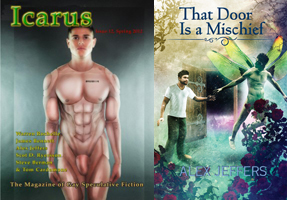
Tattooed Love Boys
The second week, Emma discovered a tattoo parlor down an alley off the main square. The young man behind the counter took one look at her and said, in careful English, “You are too young for a tattoo.”
“I don’t want a tattoo. I don’t think I do. My brother does.”
Fantastical adventures of two young American siblings in the contemporary hinterland of Charlotte Brontë’s Labassecour. First published at GigaNotoSaurus, 1 March 2012. Reprinted in my collection You Will Meet a Stranger Far from Home, Lethe Press, July 2012. Reprinted in Wilde Stories 2013: The Year’s Best Gay Speculative Fiction, edited by Steve Berman, Lethe Press, July 2013.

Really smart and weird play with gender. Fun, strange experiments, written lightly, with tongue a bit in cheek, the kind of thing you want to watch because you want to see where the author is going to dart next.
—Rachel Swirsky, “Novelette Recommendations 2012” @ Alas, a Blog
Alex Jeffers’s “Tattooed Love Boys” is a powerful, provocative look at fluid sexuality and gender identification.
—Publishers Weekly, reviewing Wilde Stories 2013
One particularly enjoyable story, Alex Jeffers’ “Tattooed Love Boys,” deals with the confusion created by two characters rapidly and inexplicably changing genders, pronouns, and embodiments.
—GLBT Round Table of the ALA, reviewing Wilde Stories 2013
If the test of a short story is making me want to run out and find other fiction by this writer, Tattooed Love Boys succeeds wildly.
—Matt Cresswell, editor of Glitterwolf magazine, reviewing Wilde Stories 2013
Alex Jeffers’ “Tattooed Love Boys” is itself a heady, youthful diversion—one that I found crunchy and provocative, though potentially problematic, in its handling of gender, embodiment, sexuality and desire. The protagonist, as she shifts via a magical tattoo into an older-brother version of herself—and decides to stay that way—has a unique perspective on her body, her self, and her sexuality; ditto her older-brother/younger-brother/younger-sister. (Seriously, this story is pretty queer.)
—Brit Mandelo, reviewing Wilde Stories 2013 for Tor.com
Here’s something you won’t often hear me say: the best part about this story is that it’s got magic. Raf tells Emma a story about a trio of witches who, hundreds of years earlier, lived next door. Then strange things begin to happen. Without giving anything away I’ll just say that in this story the Kinsey scale is a Mobius strip. Gender, sexuality, even birth order are malleable, dependent upon the whims of the magic-wielder. It’s a trip, and a really fun one at that. And the best part? It has a happy ending.
—N.S. Beranek on her blog
Tattooed Love Boys stuck with me. Sure, it was about tattoos, beautiful boys, angels (maybe), and gender switching, which are basically the things I love most. But the writing in this story set a mood and tone that was what made the story stick with me. It had a dreamy quality that made the reader, like the characters, not question the weirdness.
—Ajax Bell on her blog
2011
Turning
Serkan did not understand the music. He hadn’t expected pop or electronica—he hadn’t known what to expect. The single flute, its tone thin and whiny, edgy, marked no rhythm he could count and lapsed only at odd short intervals, as if by accident, into melody. He did not understand the audience around him, ranked behind a low fretwork fence on the eight sides of the wooden floor. Hushed, expensively dressed men and women simply waited, many—as he looked from face to tranquil face—with their eyes closed, still as porcelain figurines. He did not understand why he had accepted the invitation to attend this outmoded rite, this performance by Konya’s renowned whirling dervishes. The invitation had been extended by a man he ought to hate. Did hate. His mother’s brother’s son had ruined him when both were just boys.
A story of sex and whirling dervishes and murder, set in the poet Rumi’s ancient city of Konya, Turkey. Finalist, in an earlier version with a different title, in the 2011 Saints & Sinners Literary Festival short story competition. First published in Chelsea Station, issue 1, November 2011. Reprinted in my collection You Will Meet a Stranger Far from Home, Lethe Press, July 2012.

Liam and the Ordinary Boy
The phone rang. Not the landline, which would actually ring, but Liam’s mobile, heralding the call with the chorus of a tune he no longer liked but hadn’t got around to replacing. He didn’t hear it often enough to be reminded. Liam’s brand of magical thinking made him believe his personal phone wouldn’t ring if it wasn’t on his person, outside the house, and he invariably set it to vibrate instead before putting it in his pocket. But the only person who ever had cause to call him, his dad, insisted the sound be turned on any time Liam set it down and walked away—it had become so habitual he didn’t even realize he did it.
Second in a projected series of seven suburban-fantasy short stories about a fairy raised by humans in contemporary Massachusetts, following “Liam and the Wild Fairy” (below, 2010). First published in issue 10 of Icarus: The Magazine of Gay Speculative Fiction, Fall 2011. Revised version incorporated into the novel That Door Is a Mischief, forthcoming from Lethe Press, September 2014.
CAPTAIN OF THE WORLD
I’m wrestling with the trunk of my old beater Jetta, trying not to break the key in the rusted-out lock, when I see something wrong with the Turkish flag sticker on the back window. For a second I can’t figure it out because I’m not really looking, it just looks like black dirt smeared on the red field below the white crescent and star. But it’s not dirt. Dirty but not dirt. Somebody’s taken a black Sharpie to it, neat, really small, all caps: WATCH YOUR BACK RAGHEAD.
Contemporary, non-fantastical story of a Turkish-American high school soccer goalkeeper. First published in Speaking Out: LGBT Youth Stand Up, edited by Steve Berman. Bold Strokes Soliloquy, September 2011. Acquired for reprint at Great Jones Street.

In Alex Jeffers’ standout “Captain of the World,” a gay, Turkish Muslim goalie fights back against both racial and sexual harassment on the soccer field.
—Kirkus Reviews
Speaking Out is a 2012 Rainbow List selection of
the American Library Association’s GLBT Round Table
The Arab’s Prayer
Whrrr-click. The door near the top of the white plastic minaret opened and the little plastic mannequin teetered onto the balcony. Its painted beard was black, its turban green, its lips unmoved. “God is great,” sang the speaker behind the door, “God is great!”
Domestic science-fiction story set in Tel Aviv in the year 2020. First published electronically in M-Brane SF #24, the second anniversary issue, January 2011; in print in the compilation M-Brane SF Quarterly #2, March 2011. Reprinted in my collection You Will Meet a Stranger Far from Home, Lethe Press, July 2012. Reprinted in Wilde Stories 2012: The Year’s Best Gay Speculative Fiction, edited by Steve Berman, Lethe Press, July 2012.
2010
Annie
Hraban woke early, feeling ill, not a surprise. Without pronouncing the words aloud or in his head, he resolved not to drink again before the equinox. He knew it was a promise he wouldn’t keep. Rolling across the bed, eyes clamped shut against the intolerable light that had wakened him, he encountered no Annie. Also not a surprise. She had never spent an entire night in his bed: he had never seen her in daylight. Not knowingly, at any rate.
A science-fiction story from the life of Anwar, last man born of woman on the planet Rahab, roughly contemporaneous with the events of “Jannicke’s Cat” (below, 2009) and several centuries before The New People. First published in M-Brane Quarterly #1, October 2010, a print compendium of issues 19, 20, & 21 of M-Brane SF plus bonus material. Purchase a copy at M-Brane Press or Amazon.

Liam and the Wild Fairy
Liam missed the school bus. Deliberately. From the far side of the rutted athletic field, he watched the yellow monster trundle away with its monstrous cargo and pulled out his phone. When he flipped it open, the animated carrousel of tiny family-n-friends photos-n-unassigned-ikons spun for a second before it settled on his dad grinning up at him. Dad #1. They’d been fighting, but still. One kept up the forms or got grounded. Liam thumbed the call key and lifted the phone to his ear.
The first in a projected series of seven suburban-fantasy short stories about a fairy raised by humans in contemporary Massachusetts. First published in issue 5 of Icarus: The Magazine of Gay Speculative Fiction, Summer 2010. Paper copies can be purchased here or a PDF here. Reprinted in my collection You Will Meet a Stranger Far from Home, Lethe Press, July 2012. Revised version incorporated into the novel That Door Is a Mischief, forthcoming from Lethe Press, September 2014.
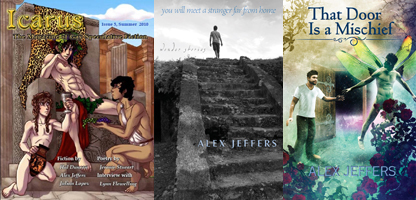
2009
Jannicke’s Cat
“Grandie, what’s this?”
“Not yours,” she said without having to think, without turning from the long view of the bay and the volcanic cone outside the bay, from memories she hadn’t left behind. “Fredo, go away. Grandie’s tired and irritable. Knock next time.”
“I did knock!” Goffredo protested.
“Did I say come in?”
“I didn’t hear you….”
“I didn’t hear you knock.” Jannicke knocked her own knuckles on the wooden rail, heaved a sigh meant to inspire guilt—although, if she remembered her own children, Goffredo was too young to comprehend guilt—and turned around. “What is it, Fredo?”
A science-fiction novelette set in the same world as The New People, approximately two hundred fifty years earlier. First published in issue 10 of M-Brane SF, November 2009. Paper, PDF, and Kindle copies can be purchased through the M-Brane Press site. Reprinted in my collection You Will Meet a Stranger Far from Home, Lethe Press, July 2012.
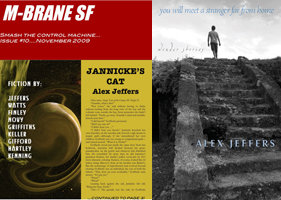
2008
Firooz and His Brother
They were all merchants, the men of his family, caravan masters, following the long road from Samarkand to the great city of Baghdad at the center of the world. A youth on his first journey, Firooz often did not know quite what was required of him. Because he wrote a handsome, legible hand and could do sums in his head, before they left Samarkand he had helped his uncle prepare the inventory: silks, porcelains, spices from the distant east; cottons, dyes, spices from the hot lands south of the mountains; carpets, woollens, leather and hides, books from local workshops. On the road, such skills commanded little respect. He could shoot, could manage both short and long blades, but the paid guards knew him for a liability if bandits were to strike: he was his uncle’s heir, they had been instructed to protect him. He made coffee when they camped, tended and groomed the horses of his uncle and the other merchants, cared for their hounds. Mostly he felt superfluous.
An Arabian Nights fantasy of the Silk Road. First published in The Magazine of Fantasy & Science Fiction, May 2008. Reprinted in Wilde Stories 2009 (Lethe Press, 2009) and The Year’s Best Science Fiction & Fantasy 2009 (Prime Books, 2010). Shortlisted for the 2010 Gaylactic Spectrum Award, short fiction. Reprinted in my collection You Will Meet a Stranger Far from Home, Lethe Press, July 2012.
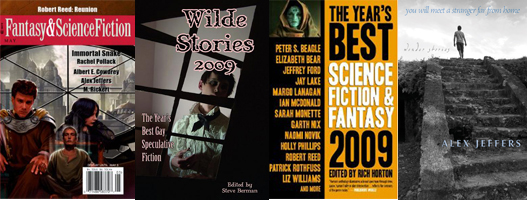
…sumptuous and slyly erotic. Of the stories by Jeffers I’ve read up til now, he does seem to excel at the gender-bending queerness side of fiction far better than your average. There’s got to be something extra-seductive about this story, as I usually despise anything in the ‘Arabian Nights chic’ branch of fiction.
—Matt Cresswell, editor of Glitterwolf magazine, reviewingWilde Stories 2009
2002
Ramazan in the Gardens of Paradise
Every afternoon when I sat down to work, I set the alarm clock on my computer to the hour and minute the daily paper had given me for sunset. Flashing ikon and synthetic beep were not so evocative as a müezzin’s chant, startling me out of my concentration, but served. I saved my document, found a towel, and went down the hall to wash. It was a temptation, splashing my face, to allow a drop or two of water between my lips. The basins in the men’s bathroom were not positioned to make it convenient to rinse one’s feet. Shuffling in my slippers, I returned to the room, laid out my rug, turned to Mekke, and said my prayers.
A story of a young Turk at Havard. Eighth of ten stories making up The Abode of Bliss. First published in The James White Review, Vol 9, No 1, Winter 2002.
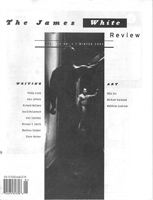
1999
Kindness
I am going to tell you about my friend, but first I must say a little about myself. I was twenty-one. I had been in Konya for two years, fulfilling my national service as a jandarma, a policeman. Of all the cities where a conscript from İstanbul might be posted, Konya is perhaps the least sympathetic. Capital of the Selçuk sultanate and ancient home of the Mevlevi dervişler, it is a kind of holy place—the only city in Turkey where one can’t buy beer. More women than not wear headscarves when they go out of the house and would not think of speaking to a man on the street, even if they know him. Atatürk had dissolved the derviş orders and closed their lodges; by law, the Mevlevi may whirl only once a year, for the tourists, but in Konya that law is largely ignored and in any case most of the tourists are Turks, Mevlevi by sympathy themselves, come on pilgrimage to the tombs of Rumi and Şams.
A story of a young Turk in Konya and Istanbul. Third of ten stories making up The Abode of Bliss. First published in Harrington Gay Men’s Fiction Quarterly, Vol 1, No 2, Summer 1999.
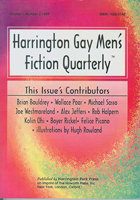
1998
The Strait
My parents were not waiting for me when, bewildered, I pushed through the glass doors from Customs. I had flown British Air, changing planes in London; every time flight attendants or captain mentioned our destination they mispronounced it. Even as the jet descended into Turkish air space I heard no announcements in my native language, only overheard it from an excited child some rows ahead and across the aisle. Then, in the airport named for the father of my country, within ten minutes I saw three portraits of Atatürk. The signs too I recognized with a start as if I’d never thought about it before—not simply the language, the alphabet, but the typefaces: unornamented, graceless, sans-serif styles that seemed to rebel against a perfumed memory of Arabic calligraphy. Turkish smells and sounds and voices overswept me. Even the air on my tongue (I stood openmouthed, breathless) tasted indefinably, indisputably Turkish.
A story of a young Turk visiting home. Seventh of ten stories making up The Abode of Bliss. First published in Men on Men 7, edited by David Bergman (Plume, 1998).
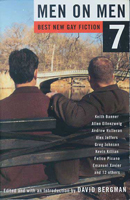
Michael in the Library
Michael was a scribe in the great library; son of a Greek father and an Egyptian mother, a free man but not a citizen, he had no fortune. Day after day, he sat at a carrel and transcribed the texts of fading scrolls onto leaves of fragrant new papyrus, which would, when he was finished, be glued together into a single strip and rolled around the wooden or ivory spindle of the book he had just copied, now discarded, of no use save as tinder for a poor clerk’s cooking fire. He had copied thus, in his fine secretarial hand, horrifying dramas by Aeschylus and Euripides; vulgar comedies of Aristophanes and comedies less lewd and less funny by Menander; Socrates’s dialogues with Plato, and the works of other philosophers; lyric verse by poets too numerous to recall their names; the histories of Herodotus and Thucydides and Xenophon of Athens. All around him, at other carrels, his fellow scribes, free men and slaves, did their own work. They wrote in Greek, Attic and the Koiné; in Latin, Persian, Syriac, Aramaic; one old man with a shaven head copied out the antique characters with which the builders of the Sphinx and the Pyramids had inscribed their chronicles. In the library were scrolls of woven silk from lands no-one alive had ever visited where, it was said, the men were of yellow complexion and had slanted eyes like a cat’s. These scrolls had never needed copying; in any case they were curiosities only. No scholar or scribe in the library could interpret the fluid script, which appeared to have been written with brush rather than pen.
A story about the creation of stories, set in Roman Alexandria. First published on line at Blithe House Quarterly, Vol 2, Issue 2, Summer 1998.
1997
A Handbook for the Castaway
By noon o’ the 3rd day, as being convinced both I were alive and would survive, I looked ’round about myself. I took stock. This was my position: I was utterly alone. The Golden Panther foundered and all hands lost. Myself was lost, if living; and tho’ regretting not my survival could not doubt as my fine captain and fond shipmates all were drowned, a very famous feast for the fishes of this perverse warm sea. Sweet Tom, indeed, my especial camarado, often boasted he couldn’t swim a stroke. “Hot bath water,” he would say, “ashore in port, with a pretty man to bring me tabaccie and rum and kisses, is all the water I wish ever to become intimate with. Altho’,” he’d say, “pretty men are still rarer’n hot water or ports of call, my dear, and myself would gladly settle for your attendance. Say you, hey, Robin? Would attend me at bath in Freetown or Port o’ Spain and we return to the Caribees?” And I: “Who to attend on Robert?” My camarado: “Why, Tom himself. Who other?” Tom was drowned, I could not doubt it. Sweet Tom was surely drowned.
Confessions of an eighteenth-century pirate shipwrecked in the South Seas. First published in His 2, edited by Robert Drake with Terry Wolverton (Faber and Faber, 1997). Acquired for reprint at Great Jones Street.
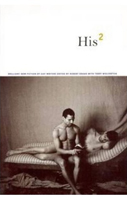
Three Men I Want
I am enamored of a man I’ve never met. Physically, facially, he doesn’t appeal to me at all—I’ve seen photos—being one of those square-faced northern Slavs, washed out, tepid, boyish in a way that’s faintly repellent. He resembles Mikhail Baryshnikov. Not his body … well, I don’t know about his body, but it seems unlikely: he’s not a dancer. Not to say that a dancer’s body would appeal to me more. Too much muscle makes me nervous; big thighs especially I dislike. The truth, shameful as it is, is that I like scrawny men. Men with big hands, prominent, boney wrists, and skinny arms. Men who, when they take their shirts off, you can count their ribs. And my erotic compass points south, toward the Mediterranean; east, toward the Levant. Blond, brawny, blue-eyed Swedes and Teutons and Poles need not apply.
A non-fiction short story or, in the editor’s words, a gay erotic confessional. First published in Flesh and the Word 4, edited by Michael Lowenthal (Plume, 1997).
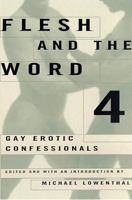
1996
The Voice of the Capon
Saturday, 13 March 1993
Dearest heart, life yourself,
I could phone you easily enough—speed-dial button A, one touch—although I’d probably wake you up. Or I could take my life, and my key to your apartment, into my hands and venture out into the blizzard. I timed myself once: it takes twelve minutes to walk from here to there. Even in this storm, it wouldn’t be much longer. But then again I’d wake you, and you said you’d had a tough week. And you said—these were your words: “It hasn’t snowed properly for three winters—you’re out of practice.” Just a moment ago, I saw the clouds light up for an instant and heard thunder: never before, in a snowstorm.
Two excerpts from the unpublished novella “Dramma per Musica; or, The Frenzy of Alexander,” concerning present-day erotic obsession and the opera seria in eighteenth-century Venice. First published in Best Gay Erotica 1996, selected & introduced by Scott Heim, edited by Michael Ford (Cleis Press, 1996).

The Padishah’s Son and the Fox
In the name of God, the merciful, the compassionate. Once there was or once there was not, in a country so far away you could not reach it in forty days, a padishah whose chief wife bore him a son as brave and lovely as a fourteen-day moon, and the father named his son Izzet—that is, Glory. Then it was eleven years later, Izzet lately circumcised and removed from the haremlik and his mother’s care, when a minor concubine bore the padishah a second child and, giving birth, expired. This concubine was a foreigner, an infidel, a slave; the padishah had been fond of her solely on account of her beauty, and he felt at once that there was something strange about the child. Nevertheless, he had a wet nurse found for it, but when the little boy was three years old, a puling brat, he called his son to him and said, “I see that this child will be a great trouble to you if it lives, my son. Therefore take it away to the mountains, kill it, and bring me back a cup of its blood for me to drink.”
A traditional Turkish folk tale reimagined as gay porn. First published in Happily Ever After, edited by Michael Ford (Richard Kasak, 1996). Unabridged and expanded edition published as its own book in 2013.
The Palace at Midnight
The full moon hung high above the ruins, a polished silver coin larger than a quarter: a five-peso piece, at a time when that denomination would actually buy something—a pack of harsh, unfiltered cigarettes, with change left over. Leaning back against the cold stone steps, we inhaled on our cigarettes. When we exhaled, the invisible smoke rose up to the sky like incense. In bright moonlight, I could see the solid piers across the courtyard, holding up the heavy mansard roof of the arcade, but couldn’t make out the fragmentary stucco sculptures on them; could see the heavy stone slabs propped against the foundation, but not make out the figures carved in low relief. One of them, I recalled, was naked, his grossly large penis hanging below his knees like an apron. If I turned my head, only a little, in the bright moonlight I could have seen the face of the man beside me, but not have made out his eyes.
Porn in the Maya ruins. First published (badly butchered) in Advocate Classifieds #99, 1996. Reprinted (in restored form) in Aroused, edited by Lawrence Schimel (Prowler Books [UK], 1999).
The World of Men
I wanted to see something of the world on my first trip into it, so I left İstanbul by sea. The Ambasciatore, an Italian ship, departed from the Asian shore, from the docks on the Marmara below Haydarpaşa. My family had come to see me off. Even my grandmother came along, elegant and correct in her ancient black Chanel suit, glad of a rare outing down the Bosporus if not glad to see me go. Not that she didn’t heartily approve of my leaving the country to study; she had sent her own sons abroad at the appropriate times. Her antique mother-in-law, who lived with us as well, was too frail to leave the house and did not, I think, quite understand how far away I was going. In any case, my great-grandmother had difficulty distinguishing among her many descendants. I had knelt down that morning in the dim, scented, filtered light of the gallery above the garden, where she sat as erect and fastidious as any Ottoman dowager in the harem, and, not convinced I would see the old lady again in this lifetime, I kissed her tiny hand, pressed it to my brow, asked for her blessing.
A story of a young Turk at sea. Abridged version of the fourth of ten stories making up The Abode of Bliss. First published in Modern Words: A Thoroughly Queer Literary Journal, No 4, 1996.
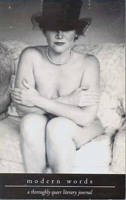
1994
Composition with Barbarian and Animal
They brought the animal to me because it was the prince’s favorite and it was broken. I was, it seemed, the only barbarian in the capital. These grounded folk! I said to myself, amused and appalled—they insist upon their own individualities, celebrate minor ethnic, religious, national differences, and yet they assume one barbarian to be much like another, all equally and similarly skilled. The naked priest laid the animal, wrapped in a silk scarf, on my table and said that if I could fix it the prince would see me.
A science-fiction novella set on a distant, exotic world of the far future—or the far past. First published in Universe 3, edited by Robert Silverberg and Karen Haber (Bantam Spectra, 1994). Reprinted in Things We Are Not, edited by Christopher Fletcher (M-Brane Press, 2009), which may be purchased here. If I don’t die first, this should one day form the first chapter of a novel, The Barbary Roads.
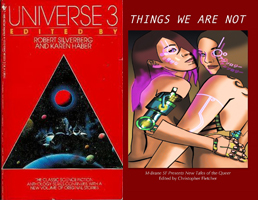
1992
The Fire The Fire
We broke camp in the pale light before dawn. According to the old man’s map we would reach the place he called the House of the Mouth before noon. Pondicherry grumbled at the dark and the earliness and the mugginess as she sipped at her bitter whitebark tea. Aussin had caught a small bird before the rest of us were awake; he crouched by the fire and ripped at the tiny corpse with white slivers of teeth. Green grimaced with elaborate distaste. The leader of our expedition, O!i, calmly asked Aussin and Pondicherry to hurry their breakfasts as hse wished to start soon.
A science-fiction story of archaeology and redemption. First published in Universe 2, edited by Robert Silverberg and Karen Haber (Bantam Spectra, 1992).

From The Bridge
You don’t notice them easily. When he comes into il Paradiso he’s just another joachim, a little richer maybe, a better cut of clothing than what hangs around and below most of the seventeen pairs of eyes that swivel, inevitably, to watch him. He’s no taller than most, say one-point-seven meters, lean and fit. The lights are kept dim here in Heaven, but he’s fair, we can see that, and his features are pleasant. He walks in the door with the same swagger we all assume in this territory: the arrogance of the doubly oppressed. We know why he’s here. We watch him.
A science-fiction horror story set in the gay clubs of a future San Francisco conquered by aliens. First published in Universe 2, edited by Robert Silverberg and Karen Haber (Bantam Spectra, 1992). Reprinted in Icarus: The Magazine of Gay Speculative Fiction, Issue 2, Fall 2009. Purchase a paper copy here or a PDF here.
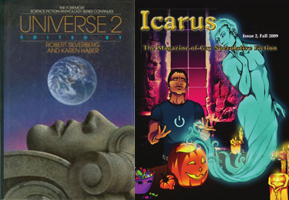
1990
My Face in a Mirror
He came out of the dressing room. The broad, padded shoulders of the blazer structured his torso, gave it some weight and solidity, began to resolve the contradiction of his growing four inches in as many months without gaining ten pounds. He’ll be as big as his father. “You look sharp, Toby,” I said, “a real clothes horse.”
A short excerpt from an early draft of Safe as Houses. First published in Men on Men 3, edited by George Stambolian (Dutton/Plume, 1990).
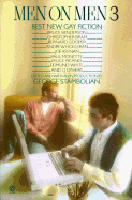
1988
Cartography
Above the beach, high overhead, there is another shore. Remember this. There is a vast continent of shining cloud that stretches east over the earthbound continent, scored with rivers of air and humped with hills. Its coastline follows the inlets and points, the great curve of the bay, as though two pencils yoked in a pantograph drew the same line on separate sheets. As though the sky were an etching lifted from its plate. But though the Pacific lays a watery waste as far as the horizon, the ocean above is crowded with reefs and archipelagos that pattern the cobalt depths, impasto flecks of grey on a dropcloth. The ocean above lies still as air, calm and frozen. Below, the heavy muscles of the Pacific send throes of low surf against the beach. Waves begin to break in the south, then race northward with a muffled, rising roar, and pound past on their way to the rocky peninsula that ends the beach. Along the waterline, flat reflective viscous sand accepts footsteps and transforms them from prints to pooled blots. Still water reflects stars plunged into the bays, bights, channels, and straits of the aerial archipelago.
A short story of the early AIDS-era about not allowing oneself the opportunity of becoming positive. First published in Issues Monthly, May 1988.
1987
Saying Grace
Clues. I live in San Francisco, in the second-floor flat of a meticulously restored Victorian. There are fitted mini-blinds on the windows, small Oriental rugs on polished tongue-&-groove floors, brushed aluminum frames around pale abstract art posters, large architectural plants. There is a small nervously good-natured black cat named Twyla Thirp. The flat has two bedrooms and I am advertising, unhappily, for a roommate. Three dear friends have died all in the last six months—all young men—all dying of the same hideous, wasteful, wasting, pointless and horrible disease. I am wary of every cough and fever. Yet I can count myself lucky, in a noxious, comparative way: I have my health, my flat, my not inconsiderable income, my pretty things: my tally of loss is low against friends bereft of more (quantitatively and qualitatively), against a city and a community whose best and brightest have set out on the long march. That I am lucky is no comfort. I am exhausted by grief. I am scared to death.
Short story about the bereaved survivors of an early victim of the AIDS epidemic. First published (as by Alex Herne) in The North American Review, Vol 272, No 2, June 1987.

1985
Paperback Romance
When my secretary buzzed I was not pleased. “No calls,” I said. “I said no calls, Toby!”
“It’s the Pink Lady, boss,” Toby said, “and she will not be gainsaid.”
Porn in the publishing world. First published (as by Michael O’Malley, possibly under a different title but who remembers?) in Mandate (vol & no irretrievable), 1985. Reprinted in Hard at Work, edited by David Laurents (Zipper Books [UK], 1999).
1981
The Celebrants
Our ancestral sun rose up out of the bleeding sea and the grey sky became white. I felt very much alone and in many ways uneasy. Beside me on the moist sand, kneeling, Karidann began to keen. Her voice, sharp as a laser, burned through the dawn in the old lament—which I had heard for the first time only three Earthmonths before. Somewhere behind us in the city Cyasi-Festival her two companions Jaïlé and Mist would be moaning too. On their world of Eles the sun is a demon to be appeased and whose advents signals fire and despair.
A science-fiction story about reconciliation and its opposite. First published (as by Peter Santiago) in New Dimensions 12, edited by Marta Randall and Robert Silverberg (Timescape/Pocket Books, 1981).
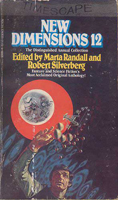
1980
A Chrysalis Unbroken
Mr Sediki searched for twenty years. He was very rich and very famous and he had a ship called Winged Hope that he piloted himself. He was seeking something special that he was sure he needed, though he wasn’t sure it existed; and in the process he visited all the settled worlds within the area of the Human Diaspora, and a few without. He found what he sought, but that will be told of after.
A science-fiction story about flight. First published (as by Peter Santiago) in New Dimensions 10, edited by Robert Silverberg (Harper & Row, 1980). I may or may not decide this is worth revising (needs it) and making available again.
1979
The Sands of Libya Are Barren
A science-fiction ghost story. First published (as by Donnan Call Jeffers, Jr) in New Dimensions 9, edited by Robert Silverberg (Harper & Row, 1979). This little story, of which I was once so proud, occasioned a delightful ripping-apart by the erudite and ferocious Joanna Russ in her review column in The Magazine of Fantasy & Science Fiction—my first review, and a doozy.
1978
When the Morning Stars Sing Together
So he does it, now, at longest last. The memory is on; some year it will be heard, whether on Earth or elsewhere: First Symphony for Unaccompanied Starship.
A science-fiction story about music, superluminal travel, and theogony. First published (as by Donnan Call Jeffers, Jr) in New Dimensions 8, edited by Robert Silverberg (Harper & Row, 1978). Reprinted in The Best of New Dimensions, edited by Robert Silverberg (Pocket Books, 1979).
1976
Mask
A hopelessly inept, adolescent science-fictional retelling of the Orpheus-Eurydice story. God alone (who is merciful and compassionate) knows why Bob Silverberg (who is also merciful and compassionate) bought it. First published (as by Donnan Call Jeffers, Jr) in New Dimensions 6, edited by Robert Silverberg (Harper & Row [US]/Gollancz [UK], 1996). If you’re determined to read it (please don’t), you’ll have to track down a used copy.
There are at least two stories from the 1970s missing from this list, as well as two other excerpts from Safe as Houses from the late 1980s, but I don’t presently have access to my files to determine their placement. Someday.